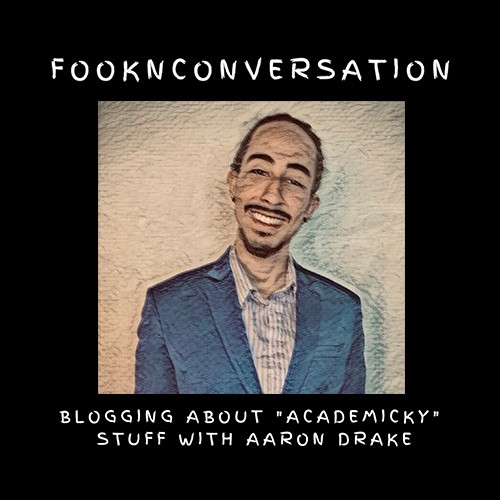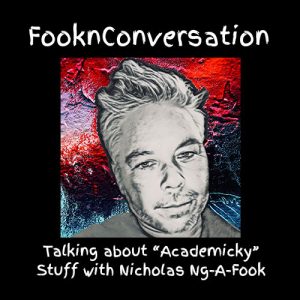
A blog by Aaron Drake.
Cathryn van Kessel, in her podcast interview with Nicholas Ng-A-Fook reminds us, that if we are not standing up against the evil banalities of everyday life, we fall privy to believing that atrocities are behind us, and not possible in today’s context. As I hope to illustrate, this is far from the truth.
Black Lives Matter: A Case Against the Defense of Fragile Beliefs
It is worth noting, that such mechanisms for self-preservation and defense can be countered with a pedagogy of “acceptance and nurturance of difference” (van Kessel, 2019, p. 5). In her text, van Kessel uses the word “tolerance” but cautions against such notions in her podcast interview with Dr. Ng-A-Fook as tolerance can often be perceived as an assimilation and accommodation.
van Kessel draws our attention to the following the four forms of defensive reactions:
- Assimilation
- Derogation
- Annihilation
- Accommodation
My goal here is to describe these four defensive reactions in light of the protests taking place around the world today in response to the murder of George Floyd and many other innocent black men and women.
Assimilation describes the process of a person holding alternative, and often times, countering worldviews to one’s own attempting to convert the latter into the former’s belief system (van Kessel, 2020). Former Brietbart employee, and current HuffPost employee Michelle Fields, pries fellow journalist Juan Williams in pleading that Black Lives Matter is simply a politically correct statement that should truly be ‘All Lives Matter’ (foxnews, October 15, 2015). “Yes there are lots of blacks who are suffering here in America. There are also lots of Asians, Caucasians, Latinos who are suffering…” (foxnews, 2015, p.1). Such an effort to call for ‘all lives matter’ is a clear declaration of assimilation. It dilutes the potency and messaging implicit in the Black Lives Matter movement, and ultimately prevents the voices of the ‘opposing’ perspectives to be challenged.

Derogation is what we see most prevalent throughout history. By degrading, belittling, or insulting the opposing perspective, it becomes easier to maintain one’s own worldview, and ultimately reduce the anxiety that van Kessel notes is upheld by one’s beliefs (van Kessel, 2020). Fox News anchor, Tucker Carlson on June 9th, 2020 stated on air, “This was without precedent in the modern era. A small group of highly aggressive emotionally charged activists took over our culture” (Foxnews, June 9th, 2020). Regard the language here “small group…, Aggressive…, emotionally charged…, our culture.” What Carlson is doing here is positioning the black community as separate from his own, and in his position as a patriotic American sitting in front of red white and blue and a backdrop of the pentagon, the views of those protestors couldn’t possibly represent our beliefs. In one fell swoop, Carlson degrades the black lives matter movement, creates a binary between right and wrong, and separates the demands of justice from the beliefs of the greater United States. The rest of the ‘news’ show (if one can call it news) espouses condescension and undermining that his viewers will absorb and churn into apathy.
Annihilation is tragically the spark that ignited the flame with respect to the Black Lives Matter movement. In Canada, the list of names grows larger: Regis Korchinski-Paquet, Jason Collins, D’Andre Campbell, Olando Brown, Andrew Loku, Jermaine Carby, Kwasi Skene-Peters, Marc Ekamba-Boekwa, Sammy Yatim, Ian Pryce, Alain Magloire, Nicholas Thorne-Belance, Phuong Na (Tony) Du, René Gallant, Abdurahman Ibrahim Hassan, Bony Jean-Pierre, Abdirahman Abdi, Pierre Coriolan, Brydon Whitstone, Josephine Pelletier, Nicholas Gibbs, Jaskamal Singh Lail, Chad Williams, Greg Ritchie, Machuar Madut, Sean Thompson, Randy Cochrane, Eishia Husdon (CPEP, 2020), are an unforgettable group of people who have lost their lives to police annihilation. It isn’t hard to see the connections between these names and the actions that has been pushing this movement towards justice. Here van Kessel (2020) reminds us:
If groups of people with opposing beliefs can be injured or killed, the implication is that their beliefs are truly inferior to our own. Further to this point, by eliminating large numbers of people with a different version of reality, the threatening worldview may cease to exist, and thus no longer pose a threat. (van Kessel, 2020, p. 6)
The fourth and final defense mechanism as highlighted by van Kessel is Accommodation. In the context of neoliberal oriented, bureaucratically run, meritocratically perceived country such as Canada, the stings of accommodation are nefarious, and deep. For van Kessel, this is defined as “By adopting aspects of a potentially threatening worldview, that threat is diffused and absorbed” (van Kessel, 2020, p. 6). But this may also take the form of policy making micro reforms in attempt to appease the respective demographic. This is likely to surface in the following weeks in light of the demands of Canadian and United States protestor’s calling for a complete defunding of the police services under the hashtag #DefundThePolice (CPEP, 2020).
Small victories should be acknowledged however, as the Minneapolis City Council members announced on June 8th that they have veto proofed a motion to defund the police department (CNN, June 8th, 2020). One council member notes “[Councilman] Bender and other council members analyzed the nature of 911 calls by constituents, she said, and found most were for mental health services, health and EMT and fire services” (CNN, June 8th, 2020). Yet, it is hard to say if outside of the epicentre of these protests, the world will adopt similar polices. In Toronto, Canada for example, one city council member proposes a 10% cut to the police budget, and is immediately met with resistance (CBC, June 9th, 2020). Premier Doug Ford is noted saying “I think we need strong police within the communities. What we do need to do is have a higher standard. We need for focus on more training” (CBC, June 9th, 2020). Predictably, our counsillors will likely take steps to resist such efforts, even if those efforts are small, and made in an effort to quell, appease, and accommodate the demands.
At the time of writing this initial response it was early June, and though there was a sense of doubt, it was mixed with hope. On June 30th 2020, Toronto Mayor John Tory, along with 15 other council members voted against a 10% police budget cut (Toronto City Council, June 2020). In a failed effort to appease voters and protestors, 17 council members voted for advanced funding towards body cameras. I am left disheartened, frustrated, and dismayed. To see our mayor blatantly ignore the needs of his community along with 16 other council members in Toronto makes me question the impact that movements can make in a system that does everything it can to not acknowledge marginalized communities. I honestly don’t know how to conclude this because the truth is, this is far from over.
References:
Andone, D., & Campbell, J. (2020, June 08). Minneapolis City Council members intend to defund and dismantle the city’s police department. Retrieved June 10, 2020, from cnn.com
Carlson, T. (2020, June 09). Tucker Carlson: Black Lives Matter is now a powerful political party and has nothing to do with black lives. Retrieved June 10, 2020, from foxnews.com
CBCNews. (2020, June 09). ‘I don’t believe in that for a second’: Ontario Premier Doug Ford dismisses call to defund police | CBC News. Retrieved June 10, 2020, from cbc.ca
Criminilization Protection Education Project. (2020, June 09). CPEP. Retrieved June 10, 2020, from https://cp-ep.org/
Ng-A-Fook, N. (2020, June 08). Episode 6: Cathryn van Kessel. Retrieved June 10, 2020, from fooknconversation.com
van Kessel, C. & Den Heyer, K. & Schimel, J. (2019). Terror management theory and the educational situation. Journal of Curriculum Studies, 52(3), pp. 428-442

